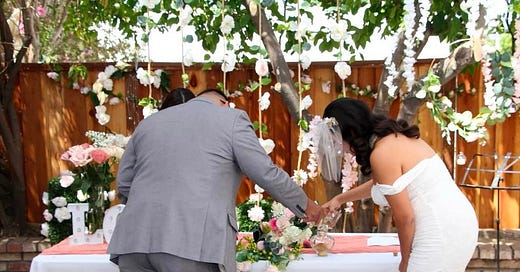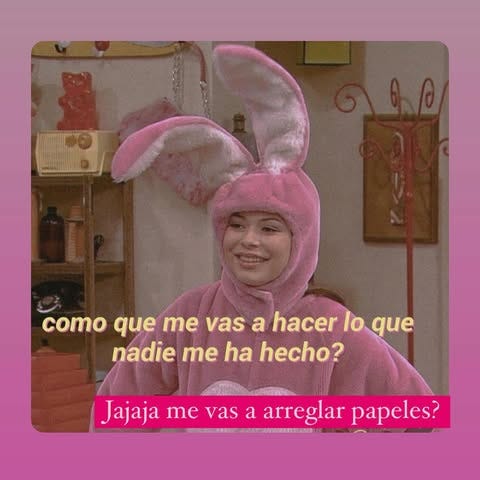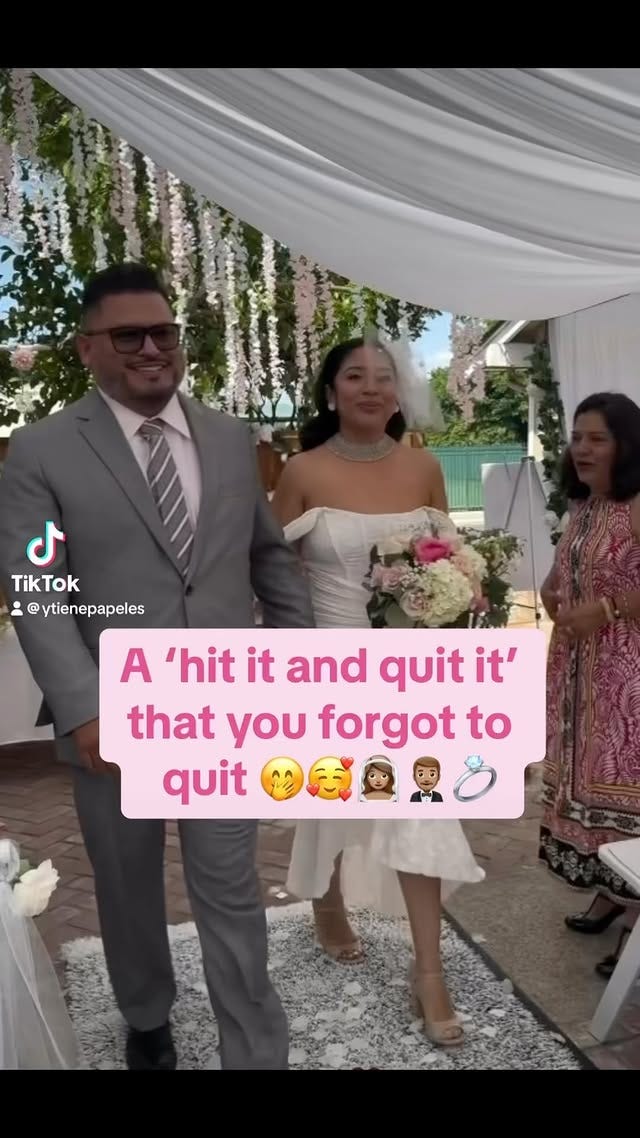La Que Se Caso Por Amor + Los Papeles (The One Who Got Married for Love + Papers)
Maria Lopez of @ytienepapeles discuesses marriage and the legal landscape undocumented people navigate both preceding their union and after.
Marriage has always been a transaction, an institution whose purposes were legally binding social contracts designed to ensure the transfer of property. The state has a vested interest in the institution of marriage through tax benefits, inheritance laws, legal rights and reinforcing its status as a civic institution. For the undocumented, marriage can provide individuals with a pathway to legal stability, but it is neither a quick nor guaranteed solution. It requires navigating a system that is often complex, expensive, and emotionally taxing.
Sorry if you thought that I would write something romantic about marriage. Maybe you’d think that I would have some passionate rant about marriage and love considering my partner and I spent all morning looking at “non-traditional engagement rings.” But alas, we must be honest with ourselves and recognize marriage for what it has always been.
What I have learned from others in my community is that none of us really give a shit about marrying for papers. Many of us have redefined marriage by centering love, commitment, and shared values over its legal bureaucratic implications. We have rejected the notion of marriage as merely a transaction for status.
In fact, a lot of us are so mortified by the idea of being deemed as “out for the green card” or even asking “Y tiene papeles?” that we have endured relationships that will lead us nowhere nor aide in our spiritual growth. But why the fuck not? Why not ask these questions or have these conversations? We can learn from the work of our LGBTQ+ community members and craft unions that feel authentic and liberatory while also navigating the legal implications of this colonized, western, heteronormative, and patriarchal institution that is marriage in this country.
Offering a vulnerable invitation into her life, memes and humor, Maria Lopez, the creator of Ytienepapeles, is offering us a more decolonized version of marriage that is grounded in love and the reality of being undocumented in the United states. Through her work we see the cost of marriage in the US.
ALIX DICK: I feel like we can keep talking forever about being undocumented. We have a little bit of time left and I want to hear about your wedding.
MARIA LOPEZ: I was just doing some adjustment of status stuff earlier so I’m probably going to get emotional.
We got engaged and married pretty quickly. Mi pareja, he was undocumented before DACA, before AB 540. He migrated from Tijuana when he was seventeen-years-old. So el solo llego al ultimo año de high school and graduated. Y no tenia any type of apoyo. So, that has a lot to do with how we connected. Porque, el seguia a mi pagina and he connected with the content. Pero ya es cidudano, he was adjusted through his mom before he turned 18. So there was never that fear of me sharing status. First of all, he followed me, so he knew exactly my type of humor, my situation.
AD: That’s so beautiful that you didn’t have to go through the stupid conversations.
ML: Exactly. So, that was really beneficial for me. He also tenia la experencia de ser undocumented. We never had to get to that stage with someone who is thinking like, you’re using me, or that I would be scared to even ask or to bring up the conversation, o lo que sea. I didn't experience that with him at all. Before our wedding we had our first meeting with our attorney to figure out what it is that we needed to move forward.
CHRISTIÁN PEÑA: What has that been like for the both of you?
ML: It definitely takes out the romance and the beautiful part of that unity when you have to extract it and you have to prove to the US government that this love and this union is for real.
AD: Wait — they do interviews and stuff? That still happens?
ML: That still happens. I’ve heard that under the Biden administration, some people have gotten lucky enough not to have to go through interviews, but we are still not there. A lot of our things are already combined but we sill have to start a bank account together. He recently put my name on his lease, that type of stuff. It’s going to take a while. The one nice thing out of all of this is that we just got our wedding pictures.
AD: Do you worry that your account will affect this process?
ML: People have asked me — I think especially because some undocu-creators tend to keep it on the down low. But I will keep putting it out there. I feel like it could be helpful to somebody. And you know I have talked to my attorneys about it.
AD: What did they say?
ML: Before I began this process, Luis Cortes actually reached out to me and offered to do my adjustment of status, which was so nice of him. But I decided that it would be easier to just do this process with the same lawyers that helped me get my DACA and everything. I wanted to keep it all in one place. But I did ask him, “When I begin this process will I have to deactivate my account?” Porque yo tengo trauma with being investigated right — I lost my job because of this account. So, eso sí es traumante porque sientes que estás haciendo algo mal. I always feel like oh my god they’re going to think I’m a fucking terrorist, o lo que sea. When in reality the US is the terrorist.
“I lost my job because of this account. So, eso sí es traumante porque sientes que estás haciendo algo mal. I always feel like oh my god they’re going to think I’m a fucking terrorist, o lo que sea. When in reality the US is the terrorist.”
AD: I get scared about that because I’m like, I don’t know how the heck I am going to fix my status, and I am nervous still if all of the work that I do now will affect me in the future. They said that your account wouldn’t affect anything?
ML: Yeah that they’re looking more for if I’m engaging in criminal activity, meaning like selling drugs, or if I’m in a relationship with someone else and the person I married isn’t my actual partner. Stuff like that.
So Luis said, “Your page is funny. You talk shit about the US, but that isn’t a crime, so you're good.” And he also told me, “I will red flag you if you’re posting something that is weird, but so far, you’re good.” That was really reassuring because I was so sad just thinking about the possibility of having to close down my account because it’s not just a page where I make these jokes. This is a community that I have found a lot of love and support in.
CP: Aside from the legal aspect of getting married as an undocumented woman to a citizen, what has this process of getting married, adjusting your status and, some day becoming a US citizen looked like for you internally?
ML: I feel like since I have gotten married, I’ve cried a lot more. Porque es un proceso where like you’re kind of letting go of a version of yourself. Esta persona está cambiando y eres muy consciente de ello. Especially for me, because I have been so open about my status. I think por eso, ahorita my favorite meme es del perrito que dice, “Todo bien, ya lloré.” Porque yo también, it’s like, “Okay, ya lloré.” I can go on with this process and new phase in my life. It’s okay.
“I feel like since I have gotten married, I’ve cried a lot more.”
AD: Oh, it’s going to be so good. Life has been preparing you for this moment. You still have so much to share with us, and now because your status is going to change, that means that we get to witness a new chapter in your story. And I am really looking forward for your future because I know that life has so many beautiful things waiting for you. I hope that you continue to share and do life with all of us. We need you.
ML: Aw, thank you.
AD: Thank you so much for talking with us.
CP: Thank you, Maria.
Propina
We want to, again, thank Maria Lopez for sharing her words and vulnerability with us. You can follow her work on Instagram at Ytienepapeles. If you missed the first two parts of our conversation, you can find them here:
"But Like, Do They Have Papers?"
Yes, this post’s title is a poor attempt at grabbing the attention of those unfamiliar with Maria Lopez’s content on her social media page ytienepapeles. Even with the translation those who are unfamiliar with the humor of the Latino immigrant community may still not “get” it.
"El Miedo te Apendeja." (Fear makes you stupid.)
The morning after the election, with little sleep and a lot of fear, I sat at the dinner table with a cup of coffee slowly losing its warmth, catatonic and hopeless. Being afraid of what this country could do to us as undocumented Americans is not new. But there was something especially daunting and sinister about the bloody red map of the United States…
Happy new year. We’ll see you next week.










